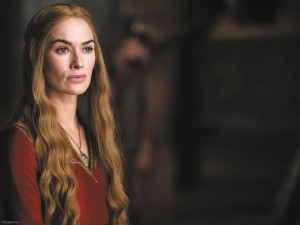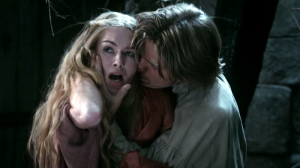***SPOILER ALERT: DO NOT READTHIS UNLESS YOU HAVE WATCHED THE GAME OF THRONES SEASON FOUR FINALE OR NEVER PLAN ON WATCHING THE SHOW (BUT YOU ALL SHOULD WATCH IT BECAUSE IT’S AMAZING)***
 The season finale for my favorite show in the entire world, Game of Thrones, was Sunday night. Although it’s based in a fantasy world that is certainly patriarchal—for example, after being beaten by female knight Brienne of Tarth in a duel, the ruthless Hound uses his final, precious seconds to add an aside about how he was “killed by a woman”—Thrones features many a strong female character. There’s Brienne, who, prior to crushing the Hound, recounted her resiliency in learning how to sword fight as a child to eventually battle with and, as we saw Sunday night, beat the boys. There’s Arya Stark, growing more cold-hearted as each episode passes, one-by-one crossing those who have scorned her family off her infamous kill list—not letting her gender get in the way of her agenda. Sansa Stark has been criticized before for passively sitting captive in King’s Landing, but season four has revealed how she has been sneakily plotting her escape from the Lannisters the whole time, using what she picked up from the devious Littlefinger to gain his trust and (hopefully) exact her revenge. On the opposite side of the spectrum is Daenerys Targaryen, the overtly just Khaleesi, whose mission before returning to Westeros is break the chains off every slave in Essos, trying to keep control of her three “adolescent” dragons along the way.
The season finale for my favorite show in the entire world, Game of Thrones, was Sunday night. Although it’s based in a fantasy world that is certainly patriarchal—for example, after being beaten by female knight Brienne of Tarth in a duel, the ruthless Hound uses his final, precious seconds to add an aside about how he was “killed by a woman”—Thrones features many a strong female character. There’s Brienne, who, prior to crushing the Hound, recounted her resiliency in learning how to sword fight as a child to eventually battle with and, as we saw Sunday night, beat the boys. There’s Arya Stark, growing more cold-hearted as each episode passes, one-by-one crossing those who have scorned her family off her infamous kill list—not letting her gender get in the way of her agenda. Sansa Stark has been criticized before for passively sitting captive in King’s Landing, but season four has revealed how she has been sneakily plotting her escape from the Lannisters the whole time, using what she picked up from the devious Littlefinger to gain his trust and (hopefully) exact her revenge. On the opposite side of the spectrum is Daenerys Targaryen, the overtly just Khaleesi, whose mission before returning to Westeros is break the chains off every slave in Essos, trying to keep control of her three “adolescent” dragons along the way.
And then there’s Cersei.
Although these female characters and a smattering of others—Catelyn, Ygritte, Margaery, Meera Reed, and even Gilly come to mind—have all been portrayed as powerful, determined, albeit human, women, Cersei has always been more difficult to interpret. My natural instinct has always been to root against her—she is a Lannister, after all—but there were certainly moments across the first three seasons that allowed me to sympathize with her, like seeing her passionate love for her children, or her ability to stand up to her father.
Honestly, as twisted as it is, I’ve also always been able to look past Cersei and Jaime’s incestuous relationship. It made me feel uncomfortable, sure, but Jaime’s absence over the past few seasons have made it an afterthought—even though it was arguably Bran seeing Jaime and Cersei “doing it” in the first episode, prompting Jaime to throw Bran off the roof, that arguably set off the entire Game. But because Jaime and Brienne were wandering Westeros, and Cersei was slinking around King’s Landing pretending to have control over her and Jaime’s insane nut-job son Joffery, I didn’t think much about their more-than-just-siblings relationship.
That is, until it was brought center stage in the third episode of season four. ***SPOILER SERIOUSLY DON’T READ THIS*** Let me set the scene: said insane nutjob son of Cersei and Jaime was just poisoned and killed. Cersei is lingering at his funeral, unwilling to leave her beloved son’s dead body. Enter Jaime—without a right hand, the one in which he drew his sword, with a gold casting in its place. In Cersei’s eyes, he is is no longer what he once was: the Kingslayer, the feared warrior who ended Targaryen rule with one swift swing of his weapon. As a result, Cersei is no longer interested in him as a lover. She tells him to leave Joffrey’s funeral, that she doesn’t want him anymore.
And that’s when the most messed up part of the scene happens: Jaime rapes her.
Cersei said no. Cersei said stop. Cersei pushed him away. Yet Jaime still forced himself on her.
Many people, including the showrunners of Game of Thrones, the director of that episode, the actor who played Jaime, and many fans, vehemently denied that Jaime raped Cersei. Even George R.R. Martin was wishy-washy on the whole situation: he tried to relate that episode to what had happened in the books, in which the act is obviously consensual. But no, they all said, Jaime was simply overcome by passion at being alone with Cersei for the first time since he returned to King’s Landing.

No, everyone: it was rape.
But, for some reason, everyone else did.Don’t worry, I tried to convince myself otherwise, too. I liked Jaime. I liked his banter with Brienne, his badass Kingslayer backstory, how his journey home from being a Stark POW made him vulnerable—and thus likeable. But, despite how much I tried to employ every excuse in the world about why what Jaime did to Cersei wasn’t rape, it was. And I couldn’t excuse one of my previously-favorite characters for what he did.
Including Cersei. Or, at least, whoever was in charge of writing Cersei’s character.
I was expecting repercussions for Jaime, a heated discussion chastising Jaime for what he did, or at least for the incident to be brought up again. But the world of Westeros ignored Jaime’s rape of Cersei, and never referred throughout the following episodes. Maybe after two weeks at Legal Momentum, where we’re working hard to ensure that all women, including and especially victims and survivors of sexual assault, possess economic, social, and political freedom, I was expecting a type of response to Cersei’s rape that we are attempting to generate at work.
But not only did Westeros ignore Jaime’s rape, it was also an afterthought in the media by the time episode four rolled around. And it wasn’t brought up either this week, when Cersei returned to Jaime in the season finale, kissed his replica hand, and passionately made love to him as though nothing had happened.
I really don’t want to place Cersei’s situation in the modern world—after all, this is Westeros, where White Walkers, dragons, and evil king-killing baby demons roam the land. But Cersei’s declaration of love to Jaime only reaffirms the unease the mainstream media has with rape, and how it so often chooses to ignore it instead of face it head on.
Game of Thrones, my favorite show, explicitly did that. The showrunners clearly made many mistakes: in the way they wrote Thrones, since Jaime’s rape of Cersei did nothing to further the plot of the show (especially since it WAS CONSENSUAL in the books), and in their reaction to the incident, since, after denying it was even rape to the media, they downright never referred to what had happened ever again. The media should’ve been harder on them, followed up, and, even though there were some key character deaths this week, should’ve dedicated at least a portion of their coverage to the Cersei-Jaime situation.
The biggest shame, however, is how people may view Cersei now: for those who remember episode 3, as a powerless slut for going back to the guy who raped her—or, as “OMG CERSEI AND JAIME ARE HOOKING UP AGAIN I FEEL UNEASY EW INCEST BUT YAY LOVE!!!” for the majority of people who fail to recall Jaime’s rape. Yes, rape. Not passion, but rape.
And the writers could’ve changed that.
We’ve all been wishy-washy in our view of Cersei, what with her diabolical ways, but the writers had the opportunity to break the Westerosi mold: to affirm yet another strong female character in the queen, in confronting the issue of rape head on. I mean, the character of Cersei is an independent woman—but she’s not. She’s written by other people, mostly men. If she were a human being, the decision to go back to Jaime (who, I think, genuinely loves her) would’ve been hers. But she’s a character, and the writers in charger of molding her fantasy persona completely shut the door on the fact that she was raped by allowing her to so effortlessly go back to Jaime. She’s been fierce enough in the past to accuse her brother of a death he didn’t commit: where’s that fire now?

Danielle – I really would like to read your blog, but I haven’t seen the season 4 finale yet, so I’ll hold off for now : ) Hope you’re having a great experience so far.
Melanie